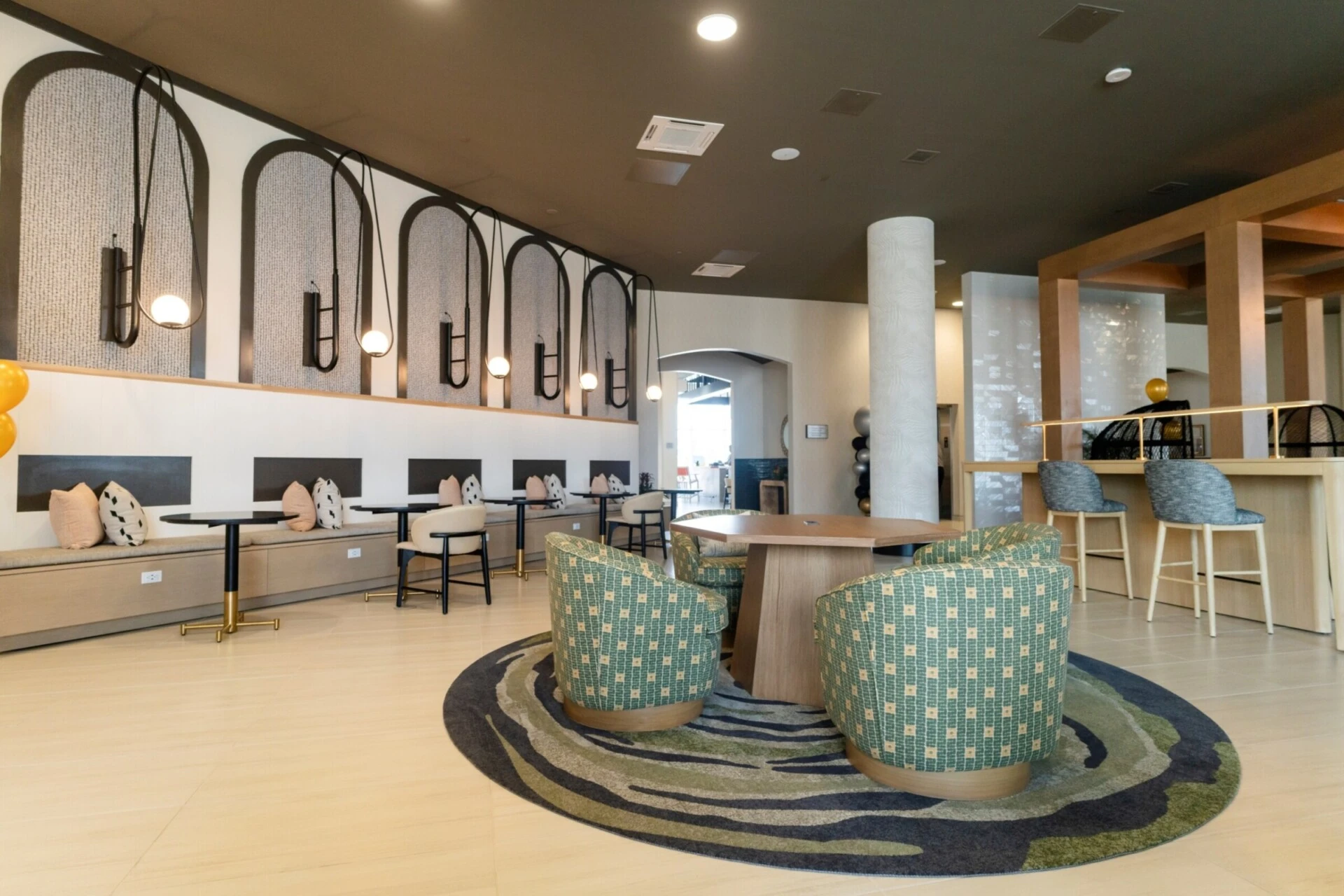
The Rise of Multifunctionality in Hotel Spaces
Stay Informed
Modern travelers demand more than just a place to sleep. They need spaces that support networking, socialization, and relaxation—all in one place. This has led to a departure from traditional, rigid layouts toward open, adaptable environments. This shift toward multifunctionality is transforming key areas within hotels, creating adaptable spaces that enhance guest experiences by seamlessly blending social, professional, and leisure functions.
1. Inviting Lobby, Bar, and Social Spaces
Hotels are transforming their lobbies into dynamic social hubs rather than just check-in areas. Thoughtfully designed layouts encourage fluid movement and interaction, with modular sofas, high-top tables, and private nooks catering to diverse guest needs. Bars, often located near the lobby, feature flexible seating arrangements such as bar stools for casual interactions, communal tables for group gatherings, and plush lounge chairs for intimate settings. Layered lighting, warm textures, and natural elements enhance the welcoming atmosphere.
These spaces also serve as professional and social lounges, offering high-speed Wi-Fi, charging stations, and varied seating options to support work and relaxation. The design allows for seamless transitions from quiet daytime meetings to lively social gatherings in the evening, maximizing the space’s functionality.
One of our firm’s favorite projects, the Cambria Hotel in Ocean City, strategically positioned the bar adjacent to the lounge space, offering stunning views of the bay. During the day, guests can enjoy a relaxing atmosphere with panoramic waterfront scenery, while in the evening, the space transitions into a lively nightlife destination

2. Versatile Event Spaces
Modern event spaces are designed for flexibility, accommodating corporate seminars, weddings, and social gatherings. Hotels use modular furniture, movable partitions, and advanced AV technology to easily transition between different event types. Adjustable lighting and decor further enhance their adaptability, creating the ideal ambiance for any occasion.
Adjacent breakout areas and lounges serve as networking zones or cocktail reception spaces, extending the usability of event venues. With quick reconfiguration capabilities, these spaces remain dynamic and efficient, ensuring they meet the needs of both large-scale events and intimate gatherings.
Our recently completed Cambria Hotel in Rehoboth Beach features a state-of-the-art event center designed for maximum versatility. The spacious banquet hall can accommodate large receptions or be divided into smaller sections for conferences and meetings. A pre-event space provides the perfect setting for cocktail hours, while an outdoor area overlooking the expansive pool and cabana area offers a stunning backdrop for summer evening gatherings. This level of flexibility ensures that the venue can cater to a wide range of events, making it an attractive choice for both corporate and social gatherings.

3. Seamless Indoor-Outdoor Transitions
Hotels are enhancing guest experiences by integrating outdoor elements into their design. Rooftop terraces, garden lounges, and semi-outdoor dining areas provide fresh air, natural light, and flexible settings for leisure or professional gatherings. These areas feature weather-resistant lounge furniture, fire pits, and shaded spaces for added comfort.
Moving Glass Wall Systems allow indoor spaces to seamlessly transition to the outdoors during warmer weather, creating open, airy environments. This design approach maximizes space usability and provides guests with a refreshing connection to nature, making these areas ideal for social events, meetings, or relaxation.
Coastal travelers seek immersive outdoor experiences, and our Fenwick Sands Hotel design, part of the Hilton Tapestry Collection, delivers just that. Its third-level outdoor pool area provides breathtaking coastal views, allowing guests to unwind while staying connected to the natural surroundings.
This elevated outdoor space also features a stylish bar, plush lounge seating, and inviting fire pits, seamlessly blending relaxation with recreation. Whether enjoying a peaceful afternoon overlooking the water or transitioning into a vibrant social atmosphere in the evening, this design ensures guests can fully embrace the coastal lifestyle.
The Future of Hotel Design
As guest expectations continue to evolve, hotels will need to prioritize adaptability in their design strategies. The future lies in creating multifunctional environments that cater to both business and leisure travelers, offering spaces that seamlessly transition between work, play, and relaxation.
Future hotel designs will emphasize adaptable architecture that optimizes both form and function. Hotels will incorporate zoned layouts, where distinct areas flow seamlessly into one another, allowing for intuitive navigation and multifunctional use. Atrium-style spaces with tiered seating, flexible lounge areas, and open-plan communal zones will replace traditional compartmentalized designs, fostering social engagement and versatility.
Hotels will also focus on maximizing vertical space with smart stacking concepts, integrating multi-level lounges, and rooftop leisure areas. Double-height lobbies with adaptable partitions will create fluid transitions between dining, social, and co-working zones, ensuring a cohesive guest experience while making the most of available square footage.
Guest accommodations will shift towards transformable spaces, with modular guest rooms that expand or contract based on demand. Fold-away walls and convertible furnishings will enable rooms to function as private retreats or interconnected suites for group stays. Additionally, hotels will experiment with multi-use guestroom configurations, integrating built-in workstations, and personalized sleeping environments to cater to diverse traveler needs.

By embracing these trends, hotels can enhance guest satisfaction, optimize space utilization, and future-proof their properties for the ever-changing demands of modern travelers.

Let’s Connect.
See the Fisher Difference for Yourself.
At Fisher Architecture, we design with intent, and we build with our clients in mind. Our work spans residential, commercial, mixed-use, hospitality, medical, and government sectors across the East Coast, with over 1,700 projects completed and counting.